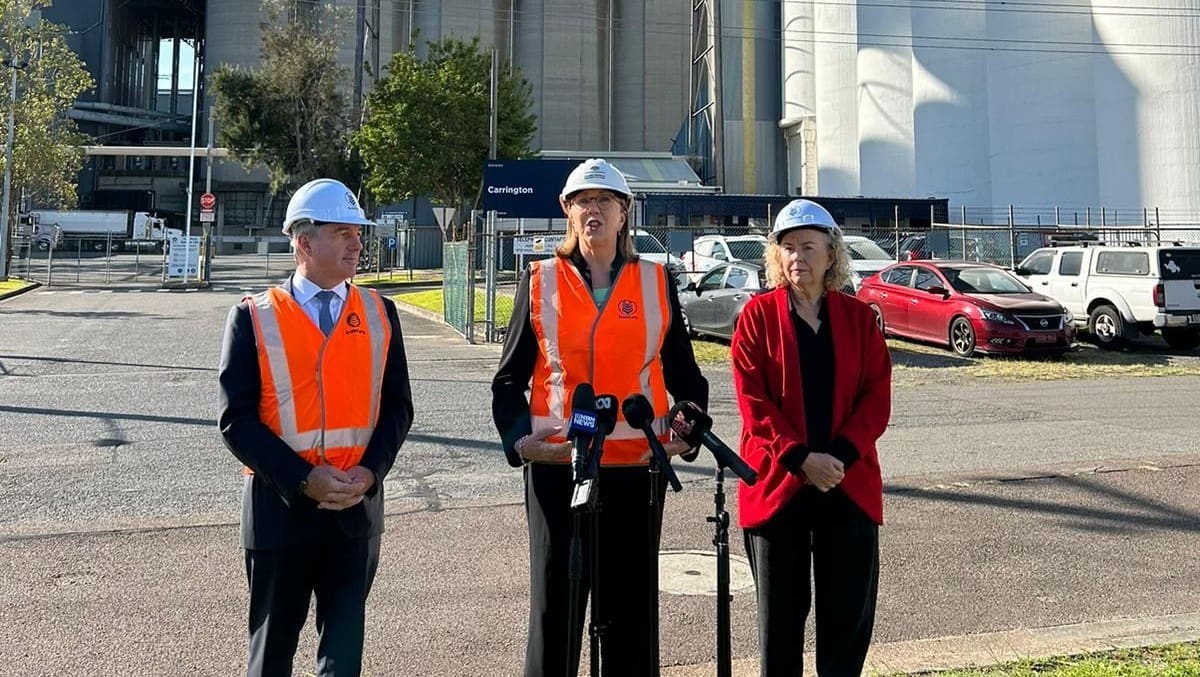
Minister for Infrastructure, Transport, Regional Development and Local Government, Catherine King (centre) visited GrainCorp’s Carrington terminal in June to discuss the opportunity LCLF brings to the grains industry. Ms King is pictured with GrainCorp managing director and CEO Robert Spurway and Federal Member for Newcastle Sharon Claydon. Photo: GrainCorp
GRAIN AND sugarcane industry groups are calling on the Federal Government to initiate a national low-carbon liquid fuel (LCLF) feedstock strategy to build on the agenda outlined in the Aviation White Paper released last week.
GrainGrowers, the Australian Sugar Milling Council and Queensland CANEGROWERS believe the development of a national strategy is crucial for turning Australia’s low-carbon liquid fuel ambition into a tangible economic reality.
The Aviation White Paper details a strategy for the future of the industry, including measures focusing on consumer rights, competition, workforce, and environmental sustainability.
It focused on the domestic production of sustainable aviation fuel (SAF), one type of LCLF.
The Federal Government has identified a domestic SAF production industry, as well as other LCLF, as a priority area under the Aviation White Paper and its flagship Future Made in Australia policy.
The Aviation White Paper highlighted the importance of establishing domestic refining capacity to reduce the chances of locally produced feedstocks being exported.
“If Australia is unable to establish a production industry, it will also mean we miss out on employment and business-generation opportunities, losing these to other countries; regional development; and liquid-fuel security benefits,” the Aviation White Paper said.
Announcing the white paper, Minister for Infrastructure, Transport, Regional Development and Local Government Catherine King said supporting a domestic SAF industry was a priority for the Federal Government.
She said over $1.7 billion was made available in innovation-program funding under the Australian Renewable Energy Agency, with some of these funds ideal to move the LCLF industry forward.
“We will be looking at that and looking at what innovations there may be in feedstock,” Ms King said.
“The fact that we export so much of our canola to Europe to produce biofuels, then have to purchase it back in at high prices is really not sustainable; it is a security issue as well in my view.
“I am very confident we will see a sustainable aviation fuel industry in Australia, and we will be playing our part in that.”
Lack of planning
Alongside SAF, other LCLF include renewable diesel, bio-gasoline and green diesel.
Possible feedstocks which can be used to produce LCLF range from food crops, such as, canola, sorghum and sugarcane, to non-food crops and agricultural and municipal waste.
Ms King has said the agricultural sector has the potential to significantly benefit from a domestic LCLF industry through the development of new markets and local value-add opportunities.
However, industry bodies believe there is a gap with current legislation to enable industry to meet the demands of the growing industry.
They believe there is a need for government leadership to ensure Australia can provide a sustainable, consistent supply of raw materials necessary for producing low-carbon fuels.
GrainGrowers chief executive officer Shona Gawel said a clear and unified strategy from the Australian Government would build on existing foundations for the development of the industry.
“Australia’s skills and experience in world-leading grain and oilseed-production practices offer a reliable and scalable lower-carbon feedstock with established supply chains,” Ms Gawel said.
“Australia is one of the largest grain exporters in the world and grows an abundance of crops that can be used for low-carbon liquid fuels such as canola and sorghum.”
ASMC CEO Ash Salardini said SAF was an “exciting diversification opportunity for the sugar industry” which could supply almost 10 percent of the domestic market through byproducts alone.
“A coordinated effort between government and industry is essential to ensure we have the feedstock available to unlock the full potential of Australia’s agricultural supply chains to supply food, fibre and fuel domestically and to the world,” Mr Salardini said.
Future Made in Australia consultation
A spokesperson for Ms King said a domestic LCLF industry would “likely lead to higher demand for agricultural feedstocks, unlocking positive opportunities for the farming sector to diversify income streams and markets and gain value from otherwise underutilised resources such as marginal land or residues”.
Submissions recently closed on a consultation program seeking industry feedback on measures to support a domestic LCLF industry as part of the Future Made in Australia initiative.
The consultation focused primarily on “the options for, and design of, production incentives and other demand side measures” which could create financial certainty for the industry.
It featured proposed solutions, such as mandates to create continued demand, low-carbon fuel standards, production tax incentives or grant-based production incentives.
“[I]n the consultation paper, the government recognises that consideration will also need to be given to how this changes demand for agricultural land and demand for crops that can also be used for food,” the spokesperson said.
“The Minister’s department is currently working through feedback received on the Low Carbon Liquid Fuels – A Future Made in Australia: Unlocking Australia’s low carbon liquid fuel opportunity consultation paper, including from feedstock and other stakeholders.
“These views will ensure Australia has the best policy settings to encourage the growth and use of both sustainable aviation fuel and renewable diesel, forging new jobs in a new industry while making our transport sector more sustainable.
“We thank those who provided their feedback, the outcomes of which – including next steps – are expected to be considered by Government by the end of 2024.”
Grain Central: Get our free news straight to your inbox – Click here

HAVE YOUR SAY